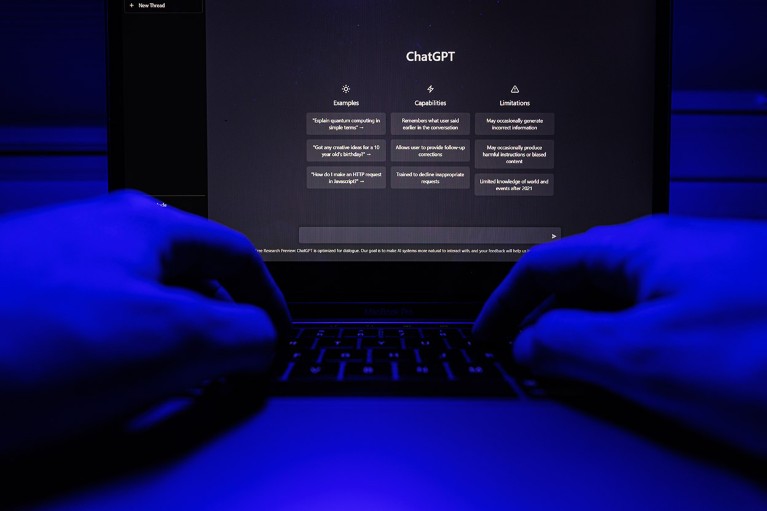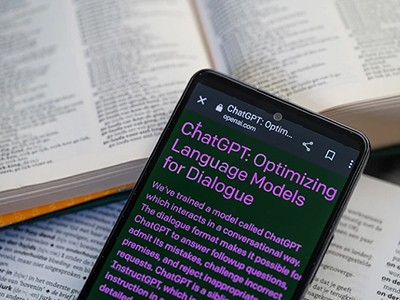[ad_1]

A research means that researchers are utilizing chatbots to help with peer evaluate.Credit score: Rmedia7/Shutterstock
A research that recognized buzzword adjectives that could possibly be hallmarks of AI-written textual content in peer-review studies means that researchers are turning to ChatGPT and different synthetic intelligence (AI) instruments to judge others’ work.
The authors of the research1, posted on the arXiv preprint server on 11 March, examined the extent to which AI chatbots might have modified the peer opinions of convention proceedings submitted to 4 main computer-science conferences for the reason that launch of ChatGPT.
Their evaluation means that as much as 17% of the peer-review studies have been considerably modified by chatbots — though it’s unclear whether or not researchers used the instruments to assemble opinions from scratch or simply to edit and enhance written drafts.

How ChatGPT and different AI instruments might disrupt scientific publishing
The thought of chatbots writing referee studies for unpublished work is “very surprising” provided that the instruments typically generate deceptive or fabricated data, says Debora Weber-Wulff, a pc scientist on the HTW Berlin–College of Utilized Sciences in Germany. “It’s the expectation {that a} human researcher appears at it,” she provides. “AI techniques ‘hallucinate’, and we are able to’t know once they’re hallucinating and once they’re not.”
The conferences included within the research are the Twelfth Worldwide Convention on Studying Representations, resulting from be held in Vienna subsequent month, 2023’s Annual Convention on Neural Info Processing Techniques, held in New Orleans, Louisiana, the 2023 Convention on Robotic Studying in Atlanta, Georgia, and the 2023 Convention on Empirical Strategies in Pure Language Processing in Singapore.
Nature reached out to the organizers of all 4 conferences for remark, however none responded.
Buzzword search
Since its launch in November 2022, ChatGPT has been used to jot down quite a lot of scientific papers, in some circumstances even being listed as an creator. Out of greater than 1,600 scientists who responded to a 2023 Nature survey, almost 30% mentioned that they had used generative AI to jot down papers and round 15% mentioned that they had used it for their very own literature opinions and to jot down grant functions.
Within the arXiv research, a workforce led by Weixin Liang, a pc scientist at Stanford College in California, developed a way to seek for AI-written textual content by figuring out adjectives which are used extra typically by AI than by people.
By evaluating using adjectives in a complete of greater than 146,000 peer opinions submitted to the identical conferences earlier than and after the discharge of ChatGPT, the evaluation discovered that the frequency of sure constructive adjectives, resembling ‘commendable’, ‘revolutionary’, ‘meticulous’, ‘intricate’, ‘notable’ and ‘versatile’, had elevated considerably for the reason that chatbot’s use turned mainstream. The research flagged the 100 most disproportionately used adjectives.

Scientific sleuths spot dishonest ChatGPT use in papers
Evaluations that gave a decrease score to convention proceedings or had been submitted near the deadline, and people whose authors had been least possible to reply to rebuttals from authors, had been more than likely to comprise these adjectives, and due to this fact more than likely to have been written by chatbots no less than to some extent, the research discovered.
“It looks as if when folks have an absence of time, they have an inclination to make use of ChatGPT,” says Liang.
The research additionally examined greater than 25,000 peer opinions related to round 10,000 manuscripts that had been accepted for publication throughout 15 Nature portfolio journals between 2019 and 2023, however didn’t discover a spike in utilization of the identical adjectives for the reason that launch of ChatGPT.
A spokesperson for Springer Nature mentioned the writer asks peer reviewers to not add manuscripts into generative AI instruments, noting that these nonetheless have “appreciable limitations” and that opinions may embody delicate or proprietary data. (Nature’s information workforce is impartial of its writer.)
Springer Nature is exploring the concept of offering peer reviewers with secure AI instruments to information their analysis, the spokesperson mentioned.
Transparency concern
The elevated prevalence of the buzzwords Liang’s research recognized in post-ChatGPT opinions is “actually putting”, says Andrew Grey, a bibliometrics help officer at College Faculty London. The work impressed him to analyse the extent to which among the identical adjectives, in addition to a choice of adverbs, crop up in peer-reviewed research revealed between 2015 and 2023. His findings, described in an arXiv preprint revealed on 25 March, present a big enhance in using sure phrases, together with ‘commendable’, ‘meticulous’ and ‘intricate’, since ChatGPT surfaced2. The research estimates that the authors of no less than 60,000 papers revealed in 2023 — simply over 1% of all scholarly research revealed that 12 months — used chatbots to some extent.
Grey says it’s attainable peer reviewers are utilizing chatbots just for copyediting or translation, however {that a} lack of transparency from authors makes it tough to inform. “We’ve the indicators that this stuff are getting used,” he says, “however we don’t actually perceive how they’re getting used.”

‘Clearly ChatGPT’ — how reviewers accused me of scientific fraud
“We don’t want to go a price judgement or declare that using AI instruments for reviewing papers is essentially dangerous or good,” Liang says. “However we do assume that for transparency and accountability, it’s essential to estimate how a lot of that last textual content is likely to be generated or modified by AI.”
Weber-Wulff doesn’t assume instruments resembling ChatGPT must be used to any extent throughout peer evaluate, and worries that using chatbots is likely to be even greater in circumstances wherein referee studies will not be revealed. (The opinions of papers revealed by Nature portfolio journals utilized in Liang’s research had been out there on-line as a part of a clear peer-review scheme.) “Peer evaluate has been corrupted by AI techniques,” she says.
Utilizing chatbots for peer evaluate might even have copyright implications, Weber-Wulff provides, as a result of it might contain giving the instruments entry to confidential, unpublished materials. She notes that the method of utilizing telltale adjectives to detect potential AI exercise may work effectively in English, however could possibly be much less efficient for different languages.
[ad_2]
Supply hyperlink

